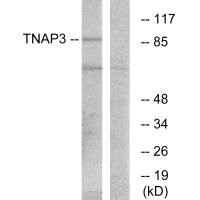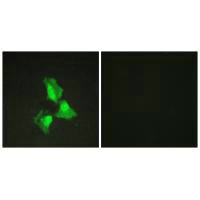
Western blot analysis of extracts from RAW264.7 cells, using TNAP3 antibody.
TNFAIP3 Antibody
CSB-PA257212
ApplicationsImmunoFluorescence, Western Blot, ELISA
Product group Antibodies
ReactivityHuman, Mouse
TargetTNFAIP3
Overview
- SupplierCusabio
- Product NameTNFAIP3 Antibody
- Delivery Days Customer20
- ApplicationsImmunoFluorescence, Western Blot, ELISA
- CertificationResearch Use Only
- ClonalityPolyclonal
- ConjugateUnconjugated
- Gene ID7128
- Target nameTNFAIP3
- Target descriptionTNF alpha induced protein 3
- Target synonymsA20; AISBL; OTU domain-containing protein 7C; OTUD7C; putative DNA-binding protein A20; TNFA1P2; tumor necrosis factor alpha-induced protein 3; tumor necrosis factor inducible protein A20; tumor necrosis factor, alpha induced protein 3; zinc finger protein A20
- HostRabbit
- IsotypeIgG
- Protein IDP21580
- Protein NameTumor necrosis factor alpha-induced protein 3
- Scientific DescriptionUbiquitin-editing enzyme that contains both ubiquitin ligase and deubiquitinase activities. Involved in immune and inflammatory responses signaled by cytokines, such as TNF-alpha and IL-1 beta, or pathogens via Toll-like receptors (TLRs) through terminating NF-kappa-B activity. Essential component of a ubiquitin-editing protein complex, comprising also RNF11, ITCH and TAX1BP1, that ensures the transient nature of inflammatory signaling pathways. In cooperation with TAX1BP1 promotes disassembly of E2-E3 ubiquitin protein ligase complexes in IL-1R and TNFR-1 pathways; affected are at least E3 ligases TRAF6, TRAF2 and BIRC2, and E2 ubiquitin-conjugating enzymes UBE2N and UBE2D3. In cooperation with TAX1BP1 promotes ubiquitination of UBE2N and proteasomal degradation of UBE2N and UBE2D3. Upon TNF stimulation, deubiquitinates Lys-63-polyubiquitin chains on RIPK1 and catalyzes the formation of Lys-48-polyubiquitin chains. This leads to RIPK1 proteasomal degradation and consequently termination of the TNF- or LPS-mediated activation of NF-kappa-B. Deubiquitinates TRAF6 probably acting on Lys-63-linked polyubiquitin. Upon T-cell receptor (TCR)-mediated T-cell activation, deubiquitinates Lys-63-polyubiquitin chains on MALT1 thereby mediating disassociation of the CBM (CARD11:BCL10:MALT1) and IKK complexes and preventing sustained IKK activation. Deubiquitinates NEMO/IKBKG; the function is facilitated by TNIP1 and leads to inhibition of NF-kappa-B activation. Upon stimulation by bacterial peptidoglycans, probably deubiquitinates RIPK2. Can also inhibit I-kappa-B-kinase (IKK) through a non-catalytic mechanism which involves polyubiquitin; polyubiquitin promotes association with IKBKG and prevents IKK MAP3K7-mediated phosphorylation. Targets TRAF2 for lysosomal degradation. In vitro able to deubiquitinate Lys-11-, Lys-48- and Lys-63 polyubiquitin chains. Inhibitor of programmed cell death. Has a role in the function of the lymphoid system. Required for LPS-induced production of proinflammatory cytokines and IFN beta in LPS-tolerized macrophages. Opipari A.W. Jr., J. Biol. Chem. 265:14705-14708(1990). Mungall A.J., Nature 425:805-811(2003). Eliopoulos A.G., J. Virol. 73:1023-1035(1999).
- ReactivityHuman, Mouse
- Storage Instruction-20°C or -80°C
- UNSPSC12352203

